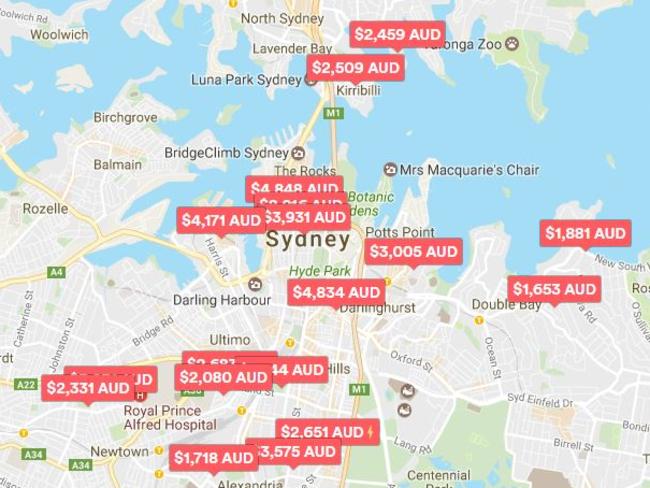Real estate industry responds to Airbnb’s plot to shake up rentals
THE real estate industry is bracing for a shake-up, with a new player aiming to allow renters to bypass leasing agents all together.
THE real estate industry is bracing for the next move of a familiar disrupter, threatening to give the highly regulated field an unwelcome shake-up.
Leasing agents and those who manage rental properties are sharpening their sales pitches to owners and tenants alike as they prepare for Airbnb to disrupt the long-term rental market.
The sharing economy giant, already on the nose with the industry that’s been unable to contain its growth and curtail its competitive effect, is set to make even more of an impact as it plans its expansion into longer leases, it has been reported.
Bloomberg broke the news last week that the app-based homesharing service had hired a major consulting firm to research the long-term rental market.
The move signals Airbnb shifting beyond short-term holiday rentals and into using its platform to help people find a place to live.
Industry leaders say they’re not worried and they wouldn’t oppose such a move, but these comments seem to be presented with an “I’d like to see them try” attitude.
While property owners, body corporates, and agents have been vocal about properties being illegally or undesirably rented out on Airbnb, industry leaders seem unconvinced the disrupter will be able to make a major impact in the long-term leasing space.
President of the Real Estate Institute of New South Wales John Cunningham says the idea has been tried before, and failed miserably.
“The reality is that this space already does exist. There’s always been the threat of a disrupter to come along. There’s always been the opportunity to do things quicker and easier. The big question mark is do they do it better?” he said.
“Whenever anyone’s tried to manage properties from a central hub it had failed dismally. The reality is you need to be on the ground in the location and do what needs to be done.”

Mr Cunningham said a major point of difference between what real estate agents do and what Airbnb would likely use their platform for would lie in screening tenants.
“This is one of the problems Airbnb is facing now. There’s no vetting of tenants. People can create a great profile, but they don’t do reference checks like we do on a tenant, that’s a great example where Airbnb’s process can’t compete,” he said.
Mr Cunningham said Airbnb could potentially use its platform to connect landlords with tenants, but leasing a property was only the start of it.
“If they want to really disrupt the industry they’ll want to get into property management, and that’s where things get difficult,” he said.
“There’s inspecting the property on a regular basis, any improvements to the property that need to be addressed, and to do that you need staff.
“I think from a landlord’s perspective, they don’t want to go down that risk path, it’s an incredibly high risk not going through all that due diligence.”
Mr Cunningham also questioned how longer term rental agreements might be formalised, and was unsure if the industry newcomer would play by the rules.
“The thing with Airbnb is they tend to ignore laws. They try to get the laws to bend to them and if you’re getting into the Residential Tenancies Act that’s not a very flexible area in terms of laws,” he said.
Throughout the world they’ve stayed away from anything that requires too much regulation.
“Australia has fairly strict controls. It’s a legal document when people are signing a lease and Airbnb likes to stay well and clear of that area. Once a residential agreement goes beyond the three-month mark, they’re getting involved in a completely different regulatory environment.
“The short-term holiday rental area is where things are very murky, outside the Residential Tenancies Act, but once it ticks over things become entirely different model. For them to go into that space would require a big change.”
Real Estate Institute of Queensland chief executive officer Antonia Mercorella said the onus was on property owners or landlords to make sure they were sticking to the law if they chose to rent out their home through Airbnb.
“The person renting out the property (the landlord) would still need to understand all of the legal issues surrounding the renting of accommodation. Whether the property is rented via Airbnb or a private ad on another portal or the newspaper doesn’t make much difference,” she said.
“Airbnb has been historically focused on holiday letting only and it’s important that people understand if they wish to use it to rent out their accommodation for longer-term leases, that there is much stricter legislation governing this and the responsibility lies with them to comply with the Act.”

Real Estate Institute of Australia president Malcolm Gunning said the threat of Airbnb meant real estate agents had to step up their game.
“If (Airbnb is) working on getting into mainstream residencies then yes, it will be a disrupter and another channel to market which will have an effect on the residential agencies,” he said.
“It’s another reminder that agents can’t take any step of the leasing or management process for granted. Unless the agent can value add to the transaction in the process, they’re going to be disrupted.”
Mr Gunning said the industry wouldn’t oppose a move from services like Airbnb (as long as they played by the rules), but would “stand up to them”.
The threat of the sharing economy moving into mainstream real estate comes amid claims investors are buying property in inner-city areas with the express intention of putting it up for short-term rental on Airbnb and similar services.
NSW state member for Epping Damien Tudehope, said in a speech to Parliament last week there were now “properties being built in Sydney’s most sought-after suburbs solely for the purpose of servicing tourists through the Airbnb market rather than being offered as a home”. Mr Tudehope told Fairfax it was an “alarming trend”.
Mr Gunning said he was aware of groups of landlords who had come together to “create an industry” by renting out multiple properties on the online platform.
“They do very well. I know a group that make a living out of it,” he said.
“The problem of course is sometimes its done illegally. They may be in contravention of strata corporation conditions and it often compromises the security of a building.”
Mr Cunningham said those who used or planned to use the relatively unregulated service, whether as a holiday tenant, long-term resident, or a property owner, did so at their own risk.
News.com.au has contacted Airbnb for comment.




